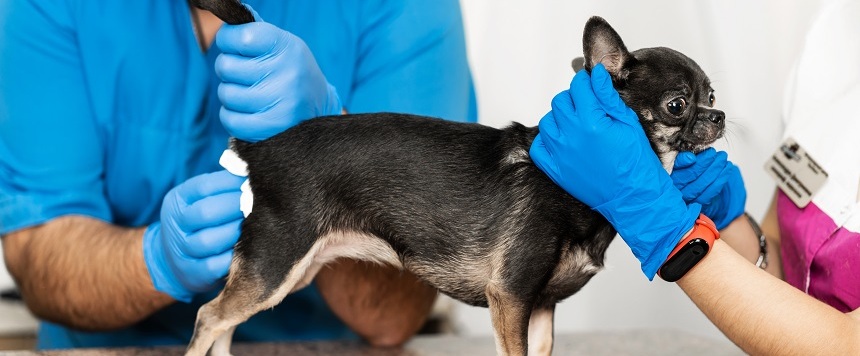🔥NEW🔥 PETHELP+ insurance is now available. Check here or call 📞 790 277 277
The anal glands are symmetrical structures around the anus in dogs and cats. They are basically the perianal sinuses, which are lined on the inside with skin and have numerous glands that produce secretions. These sinuses open directly to the anus. During defecation, the clamping of the sphincter muscle allows the discharge from the sinuses to come out. The secretion produced by these glands has a liquid or pasty consistency with a characteristic and unique smell for each individual.
This service is available in Pethelp packages. Package prices start at 59 PLN/month
Check
The animal physically discharges its anal glands with each feces. However, there are several circumstances in which it will be challenging to clear the glands' secretions, leading to their overfilling. The excess secretion should then be removed by mechanically pressing on the sinuses. Avoid emptying the glands too frequently if the animal exhibits no signs of sickness because there may be an increase in production that could result in excessive secretion. However, regular toileting is advised if we are aware that our pet has a propensity for sinus irritation and a problem with its natural emptying. This will help us avoid the maximum overflow of the glands and blockage.
Below are some of the symptoms that most often accompany perianal gland diseases:
If you notice any of them in your pet, go to a veterinary clinic and check the health of your pet!
Sinus overload is the most typical issue and is brought on by exit duct obstruction. The reason may be both individual and race conditions, but also accompanying diseases. The development of inflammation, an abscess, or the formation of a fistula of the anal glands may occur.
Factors causing issues with the anal glands include:
It is an individual matter and each pet may have different needs in this regard. In some patients cleaning is recommended every 3–4 weeks, e.g., while in others, it is recommended twice a year. It's important to keep an eye on your pet's behavior. The so-called "scooting" is a significant characteristic and the most prevalent symptom of glandular excess. We can also observe signs of itching and pain in the form of licking, biting, and screeching. In dogs with recurrent sinusitis, the veterinarian may schedule a check-up, e.g., every 2 months. During the control, we check the quantity and quality of secretions. In this way, the doctor tries to determine the best time interval between subsequent treatments so that there is no further inflammation or overload of the glands.
The treatment can be performed in a veterinary clinic. Thanks to this, the veterinarian can check the health of the pet right away. During the first visit, the caregiver may ask for tips on how to perform the procedure at home. Some pets feel most comfortable if their owner performs the cleaning at home. It is not complicated but requires some practice. Sometimes groomers also provide a service during a pet's cosmetic visit. It is worth remembering that emptying the glands too often can lead to excess production of secretions.
FAQ
The treatment costs between 20 and 40 PLN. Each veterinary clinic sets its own prices, and it is worth asking about the costs of a given service before visiting.
The perianal sinus toilet procedure takes about 5 minutes.
You do not need to prepare your pet for the procedure at a veterinary clinic.
Do you have any other questions?
All listed services are available in PETHELP packages.